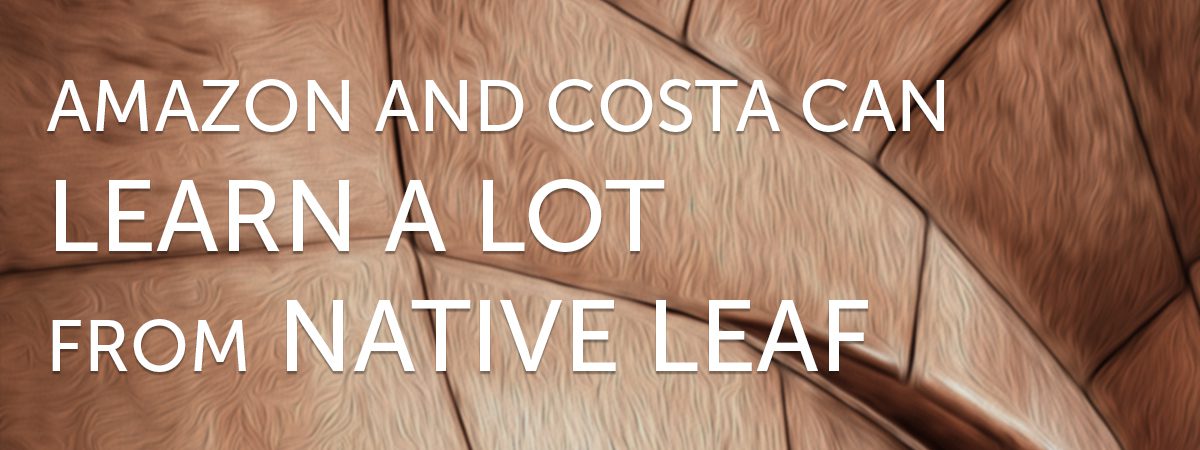There is nothing like a good hashtag to get people riled up on social media. A quick tag, a heartfelt 140 character message and an associated photo is now enough to turn a topic of interest into something viral.
This is precisely what has happened with #WasteNot. This hashtag that has been making its way through the Twitterverse since HughΓÇÖs War on Waste returned to our screens. First it is was people celebrating the joys of wonky veg and shaming supermarkets for their food waste. More recently, viewers were celebrating the independent coffee chains that embrace compostable, recyclable coffee cups and shaming the big names for their material choices. This is an issue close to the hearts of all of us at Native Leaf.
What is the issue with Amazon and Costa?
Amazon and Costa may have started a trend for excessive packaging and poor quality materials, but we are taking a different route.
This WasteNot BBC Documentary highlighted the massive problem of big name delivery companies and coffee houses using boxes and materials that are simply inappropriate in our modern world. How are we meant to look after the world and create a clean environment when Amazon ΓÇô a leading supplier in online goods ΓÇô and the big name coffee chains create so much pointless waste that goes straight to the landfill?
Some chains can be praised for thinking about where their coffee comes from or for rewarding customers for using their own refillable cups. The problem is that it would be so much easier ΓÇô and more environmentally-friendly ΓÇô to simply use a biodegradable material and allow for better recycling. As for Amazon, all they need to do is to start using order packaging that is appropriate to the goods being shipped in order to significantly cut down on waste.
So how does Native Leaf differ?
The simple answer is that we take the time to source appropriate materials and think about the packaging for our goods. From the start, we have always tried to separate ourselves from these coffee companies by providing consumers with a natural, healthy tea. Yerba Mate is about as far removed from your large Mocha with whipped cream and extra syrup as you can get.
The aim is to open the eyes of consumers so they see that this uplifting, enriching South American herbal alternative is out there, and that it can be easily delivered to their door ΓÇô from Yorkshire of all places.
Unlike Costa and Starbucks, we have ensured that the cardboard for these packing materials comes from a reliable source. The sheets are waste materials from a local factory that cannot be put to good use. Rather than see them go to waste and run the risk of polluting this wonderful county, our supplier gives them to us.
The next step shows how easy it is for companies to take the opposite approach to Amazon when it comes to order packaging. Amazon’s “state of the art” system appear to always choose a way larger box than what is needed, throw in the order and stuff it with paper, to fill the gaps. At Native Leaf, we have templates for the boxes for our different goods and can build a box from those sheets to those specifications. This means that when customers order a 500g bag╬ô├╢┬╝Γö£├¡of Gourmet Argentine Yerba Mate or one of our ceramic gourds, we know that there is a box for it that is just right with no waste.
Why is this all so important?
The concern with the efforts of Amazon and these coffee chains is that we are in a vicious cycle of behavior that will continue to harm the planet. #WasteNot showed that consumers are outraged by what is going on. The problem is that there are so many daily customers getting these over-sized packages, and throwing away the cup from their morning latte, that it is hard to see the end.
What will it take for habits to change and how much environmental damage will have been inflicted in the meantime? Native Leaf are trying to do their bit for the local environment and encourage others to do the same. If our small efforts can help to make our beautiful Yorkshire cleaner and safer, then it is all worth it.
We appreciate that Amazon don’t have the time and resources to hand-make their boxes in the way that we do, but they cannot deny that their current systems are not adequate. All it takes it the dedication to stick with recycled, sustainable materials and the realisation that over-use and over-sized boxes simply need to stop.

